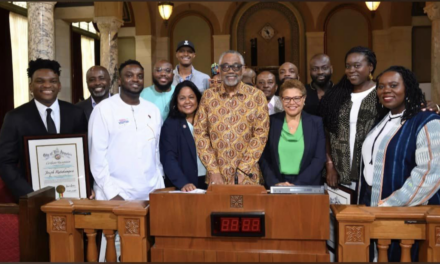As Nation Mourns, California Debates Concealed Firearm Laws
On March 28, one day after three children and three adults were shot at the Covenant School, a Christian elementary school in Nashville, Tenn., the California Senate Public Safety Committee heard arguments for and against Senate Bill (SB) 2, legislation proposing enhancements to California’s existing concealed carry permit law.

Maxim Elramsisy | California Black Media
On March 28, one day after three children and three adults were shot at the Covenant School, a Christian elementary school in Nashville, Tenn., the California Senate Public Safety Committee heard arguments for and against Senate Bill (SB) 2, legislation proposing enhancements to California’s existing concealed carry permit law.
“God bless the families of those little kids,” said the bill’s author, Senator Anthony Portantino (D-Burbank) at the hearing. “Gun violence inflicts a terrible toll on our communities. Last year, nearly 20,000 people were killed in gun related homicides in the United States. To put that in perspective, it’s enough people to fill forty Boeing 747s, and sadly, the number keeps rising.”
SB 2 would make 21 the required age to apply for a Concealed Carry Weapon (CCW), although existing state legislation restricts the sales of pistols to people under 21. A system of appeals would also be created for people initially denied the permit. The bill would also limit where people can carry firearms, creating locations called “sensitive sites” where guns would be prohibited. Property owners of sites where guns are off limits would have the authority to allow guns if they choose.
California’s prior concealed carry permit law, which required that applicants show reason for needing to carry a concealed firearm, was deemed unconstitutional by the U.S. Supreme Court last year in the case of New York State Rifle & Pistol Association, Inc. v. Bruen.
In a 6-3 vote, the high court’s conservative majority ruled that “may-issue” systems, like those used in New York, California and three other states using “arbitrary” evaluations of need, made by local authorities, are unconstitutional. States are, however, allowed to enforce “shall-issue” permitting, where applicants for concealed carry permits must satisfy certain objective criteria, such as passing a background check.
“Bruen affirmed the ability of states to keep firearms out of the hands of dangerous individuals and out of certain sensitive places. With SB 2, California does just that. It provides objective, reasonable guidance that prevents CCW permits from being issued to dangerous individuals and provides a list of places where weapons may not be carried,” said Portantino. “The presence of firearms in public increases the dangers of intentional or accidental gun violence—at the workplace, at the movies, or on the road. One study showed that states with permissive right-to-carry laws experience 29% more workplace homicides than states with more restrictive licensing requirements.”
During the hearing, opposition came from handfuls of law enforcement groups, particularly from the southern part of the state, including the Los Angeles Police Officers Association and the Orange County Sheriffs Association.
“Addressing Bruen in this way is unnecessarily complicated and overly burdensome,” said California State Sheriffs’ Association Legislative Director Cory Salzillo. “Given what we’ve seen in other states, it is likely to be challenged and probably overturned in whole or in part.”
In the nation’s most populous county, the Los Angeles County Sheriff Department (LASD) is responsible for taking applications and issuing CCWs. Though the Sheriff did not endorse the bill publicly, the Los Angeles County Board of Supervisors did, and in a written statement to California Black Media (CBM) the LASD appeared to tacitly support the bill.
“Recently, several of our California Government leaders have joined together to announce new gun legislation which would enhance gun safety laws in California. The Los Angeles County Sheriff’s Department has partnered with the Board of Supervisors on the added gun safety measures and how we can bring awareness to the communities we serve,” the statement said.
Before the hearing, CBM asked Los Angeles County Sheriff Robert Luna about the proposed bill.
“I believe we have to change the status quo when it comes to guns because there’s way too much gun violence,” he said. “I don’t want to take guns away from legal gun owners, but I always believe that there has to be a path to doing it right.”
The threat of legal challenges is almost certain.
“Any law that we passed through the Legislature, someone can bring a challenge to. That’s not a unique circumstance. This bill will probably be challenged,” said Portantino. “But do we believe it’s constitutional? Absolutely. We looked at the Bruen decision as a roadmap to create a constitutionally sound approach. The Supreme Court said you can’t be arbitrary, so this bill is not arbitrary. It’s creating concrete criteria of who should and shouldn’t be eligible to get this responsibility of having a concealed carry permit, that’s consistent with the Supreme Court. The Supreme Court said you can have prohibited places. This bill has prohibited places that make sense.”
The Bill was advanced through the committee after a 4-1 vote and will next be heard on April 10 by the Committee on Appropriations.
In 2022, California Gov. Gavin Newsom endorsed Senate Bill (SB) 918, also authored by Portantino with provisions similar to SB 2. That bill failed to pass in the Legislature.
In Florida, Governor Ron DeSantis signed a bill last week making the Sunshine State the 25th state to allow concealed carry with virtually no extra permitting or stipulations. Newsom, who spent time in Florida during the week, strongly criticized the action. “Don’t be fooled by the @GOP lies. Permit-less carry does not make you safer. States with open carry laws have higher gun violence rates,” Newsom said on Twitter.














